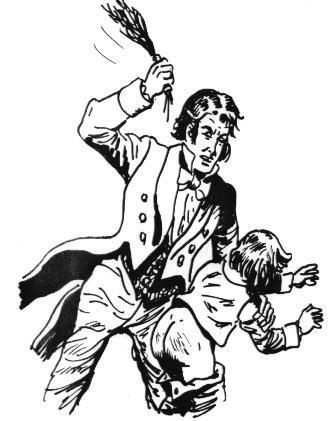For the past two centuries, corporal punishment
has been a controversial issue in Western culture. Bit by bit, the
pro-corporal punishment side has given ground as their cherished practice
has been banned in context after context. It is no longer legal to
corporally punish soldiers, sailors, apprentices, wives, servants, petty
criminals or prisoners in the USA and other western nations. Also,
the definition of "physical abuse" has gradually broadened to the point
where practices once deemed acceptable are now deemed criminal acts.
A prime example is the popular 19th century practice of flogging the young
with canes or with bundles of birch twigs. An eyewitness description
of "birchings" at Britain's Harrow prep school may be found in Virginia
Woolf's 1940 book, "Roger Frye: A Biography." On pages 32-33, Woolf
quotes Frye, a former pupil and head boy of the school:
In his autobiographical,
"My Early Life," Winston Churchill, who attended Harrow in the late 1880's,
writes about the custom at St. James School, which he attended earlier:
Punishments
like this took place routinely, and were deemed perfectly proper and nonabusive
in the opinion of the times. Few people nowadays, at least in western
countries, would hestitate to label an adult who whipped a child's bare
buttocks into a "mass of blood" as a child abuser. Yet, in the 19th
century, former recipients of such brutality routinely defended it as proper.
Admission to schools such as Eton and Harrow, where flogging was a routine
occurrance, was highly competitive. The justifications for flogging
offered by former child victims of this horrific practice differed little
from the justifications offered today by proponents of spanking.
For instance, a letter writer to _The Times_ (London, 11/15/1872) defends
flogging of schoolchildren:
The fact that this individual could not sit down without pain for days afterwards clearly indicates that the beating resulted in tissue damage. Nevertheless, like his latterday counterparts, the prospankers, this person, was keen to visit the sufferings of his own childhood onto the next generation. The _Daily
Mail_ (London, 5/8/1903) quoted a magistrate as saying:
The fact that the perpetrators of this cruel maltreatment of helpless children never drew the attention of law enforcement agencies further underscores the social acceptability of bloody beatings during the period in question. Modern sensibilities recoil from descriptions of such corporal punishments, once considered harmless and beneficial by the majority. Yet the numerous voices raised in defense of such practices bear a marked similarity to modern-day apologetics for spanking. Edward Wood,
a minister of parliment, argued against an anti-corporal-punishment bill
in a 1912 debate in the British House of Commons:
As a contemporary pro-spanker might argue, he was whipped, and look how HE turned out. He became a minister of parliment! According to the logic of all-too-many adults now living, this would indicate that whipping a child three times before breakfast constitutes "good discipline." In conclusion, the evidence indicates that there is very little in the way of physical cruelty to children which certain adults will fail to defend, provided that they themselves suffered such cruelty at a tender age. Psychological mechanisms of repression, denial, and displacement of aggression account for the widespread willingness of former child victims of physical abuse to make light of it, extoll its virtues, and advocate its use on today's children. The words of those who testify to the harmless and beneficial nature of physical punishments visited upon them in childhood deserve little weight. They talk just like the pro-birchers of yore. |
